6 Essential Pyramid Model Resources
October 27, 2022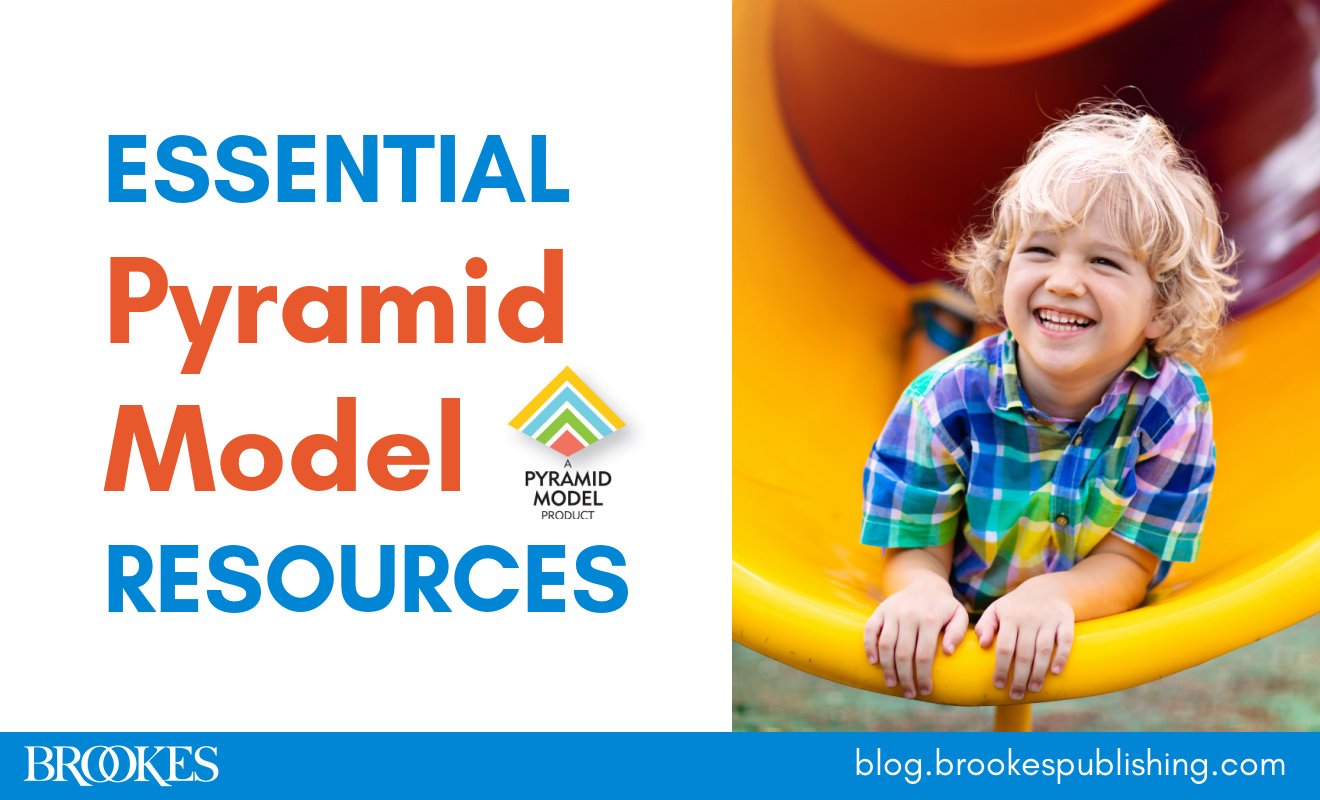
For more than a decade, the widely used Pyramid Model for Promoting Social Emotional Competence in Infants and Young Children has been helping early educators boost key social‐emotional skills in young learners. A framework of evidence-based practices, the Pyramid Model was created to help programs like yours strengthen the social-emotional development of all children, with more intensive, tiered supports for children who are at risk for delays and/or engage in persistent challenging behaviors.
In this article, we’re highlighting six resources—books, tools, and learning modules—that give you the strategies, guidance, and training you need to implement the Pyramid Model successfully. Use these resources to help nurture the social-emotional competence of young children, reduce behavioral challenges, and get all children ready for school success.
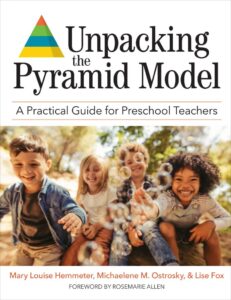 Unpacking the Pyramid Model
Unpacking the Pyramid Model
A Practical Guide for Preschool Teachers
Edited by Mary Louise Hemmeter, Ph.D., Michaelene M. Ostrosky, Ph.D., Lise K. Fox, Ph.D.
In a nutshell: The first book to provide a comprehensive, practical, step‐by‐step overview of the Pyramid Model for children ages 2–5.
Selected topics covered:
- Constructing a positive classroom environment
- Developing predictable schedules and routines
- Clearly defining and teaching behavior expectations and rules
- Delivering intentional, explicit instruction in social‐emotional competence
- Supporting smooth transitions that prevent challenging behavior
- Teaching children about emotions
- Giving children the skills to solve interpersonal problems
- Providing individualized support for children with persistent challenging behavior
Rave review:
“Hemmeter, Ostrosky, and Fox and an all-star cast have distilled a wide array of research-based Pyramid practices into a guide that will be helpful for brand-new teachers and veteran early educators alike.”—Judith Carta, Ph.D., University of Kansas
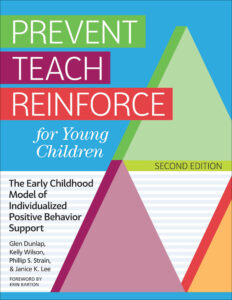 Prevent-Teach-Reinforce for Young Children
Prevent-Teach-Reinforce for Young Children
The Early Childhood Model of Individualized Positive Behavior Support, Second Edition
By Glen Dunlap, Ph.D., Kelly Wilson, M.A., ECC, Phillip S. Strain, Ph.D., Janice K. Lee, Ph.D.
In a nutshell: The updated second edition of the definitive guide to Prevent‐Teach‐Reinforce for Young Children (PTR‐YC), the premier Tier 3 Pyramid Model intervention that helps resolve persistent challenging behaviors in preschool settings.
Selected topics covered:
- Implementing all five steps of the PTR‐YC model, from teaming and goal setting to using assessment data
- Using classroom‐wide procedures that help prevent challenging behavior
- Choosing interim solutions to extreme challenging behavior
- Demonstrating the effectiveness of PTR‐YC (supported by data from a recent randomized controlled trial and single case experimental analyses)
- Ensuring fidelity and sustainability, increasing the chances for long‐term positive outcomes
Rave review:
“Grounded in behavioral science, positive practices, and educational research…provides a comprehensive and easy-to-read guide to design high-quality learning environments for all children.”—Renee Miner, M.Ed., Boise State University
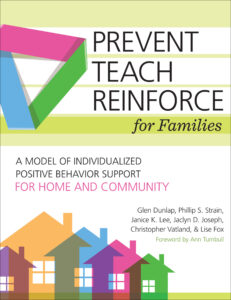 Prevent-Teach-Reinforce for Families
Prevent-Teach-Reinforce for Families
A Model of Individualized Positive Behavior Support for Home and Community
By Glen Dunlap, Ph.D., Phillip S. Strain, Ph.D., Janice K. Lee, Ph.D., Jaclyn D. Joseph, Ph.D., BCBA-D, Christopher Vatland, Ph.D., Lise K. Fox, Ph.D.
In a nutshell: An accessible guide to the Prevent-Teach-Reinforce for Families (PTR-F) model, which helps families prevent behavior problems in children ages 2–10, teach proactive communication and social skills, and reinforce positive behavior.
Selected topics covered:
- Establishing a partnership with a family
- Working together to set individualized goals and develop a vision for the child’s future
- Guiding the family through functional behavioral assessment to uncover triggers behind the child’s behavior
- Using results of the FBA to help the family build a customized behavior support plan
- Coaching the family to implement the behavior support plan with fidelity
- Reviewing behavioral data with the family to monitor how well the plan is being implemented
Rave review:
“A highly practical, family-centered and family-friendly model that is deeply respectful to children and families, firmly grounded in evidence-based practice, carefully illustrated with case studies, and imminently doable by practitioners.”—Joseph Lucyshyn, University of British Columbia

ePyramid Online Learning Modules
By the Pyramid Model Consortium
In a nutshell: Convenient online modules featuring high-quality, evidence-based instruction on the Pyramid Model. Choose from packages focused on infants & toddlers, preschoolers, and birth to five, plus special-topic modules.
Topics covered:
- Building relationships and creating supportive environments
- Developing responsive routines and using targeted strategies
- Determining the meaning of behavior and individualized intervention
- Using culturally responsive practices to reduce implicit bias, disproportionality, suspension and expulsion
- Implementing trauma-informed care within the Pyramid Model
- Practicing wellness and self-care techniques
- Implementing practice-based coaching
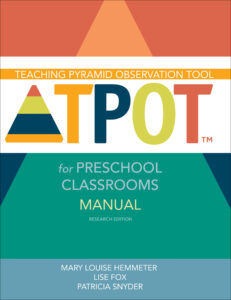 Teaching Pyramid Observation Tool for Preschool Classrooms, Research Edition
Teaching Pyramid Observation Tool for Preschool Classrooms, Research Edition
By Lise K. Fox, Ph.D., Mary Louise Hemmeter, Ph.D., Patricia Snyder, Ph.D.
In a nutshell: A reliable tool developed by Pyramid Model creators that gauges how effectively your staff is implementing 14 key Pyramid Model practices in preschool classrooms.
Benefits:
TPOT helps programs:
- Support implementation of research-proven Pyramid Model practices
- Promote healthy, age-appropriate social-emotional growth in young children
- Implement strategies to prevent and address challenging behavior
- Compare implementation across classrooms, teachers, and programs
- Pinpoint where staff members need additional professional development
- Guide training and coaching efforts
Rave review:
“In combination with the Pyramid Model, thoughtful use of the TPOT will help create environments in which all children can be happier and more engaged in learning.”—Marilou Hyson, University of Pennsylvania Graduate School of Education
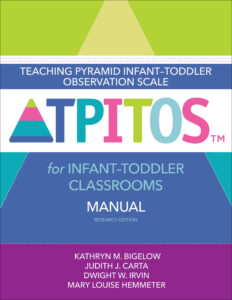 Teaching Pyramid Infant–Toddler Observation Scale for Infant–Toddler Classrooms, Research Edition
Teaching Pyramid Infant–Toddler Observation Scale for Infant–Toddler Classrooms, Research Edition
By Kathryn M. Bigelow, Ph.D., Judith J. Carta, Ph.D., Dwight W. Irvin, Ph.D., Mary Louise Hemmeter, Ph.D.
In a nutshell: Based on the TPOT for preschool classrooms, TPITOS evaluates how well your infant-toddler program has integrated Pyramid Model practices, and supports meaningful professional development for educators as they work toward mastery of those practices.
Benefits:
- Supports professional development efforts in center-based infant–toddler settings
- Helps strengthen the practices of individual teachers or caregivers, classroom teams, and entire programs
- Monitors the success of quality improvement initiatives
- Helps build a foundation for social-emotional competence in the critical first years of life
Rave review:
“Will help early childhood programs with infant and toddler classrooms to develop meaningful professional development for teachers to support our youngest children’s social emotional development.”—Elizabeth Steed, Ph.D., University of Colorado Denver
With the six resources highlighted in today’s blog post, your early childhood program can make the most of the Pyramid Model. Together, these books and tools give you the knowledge and strategies you need to help every young child develop the strong social-emotional foundation they need for future success.



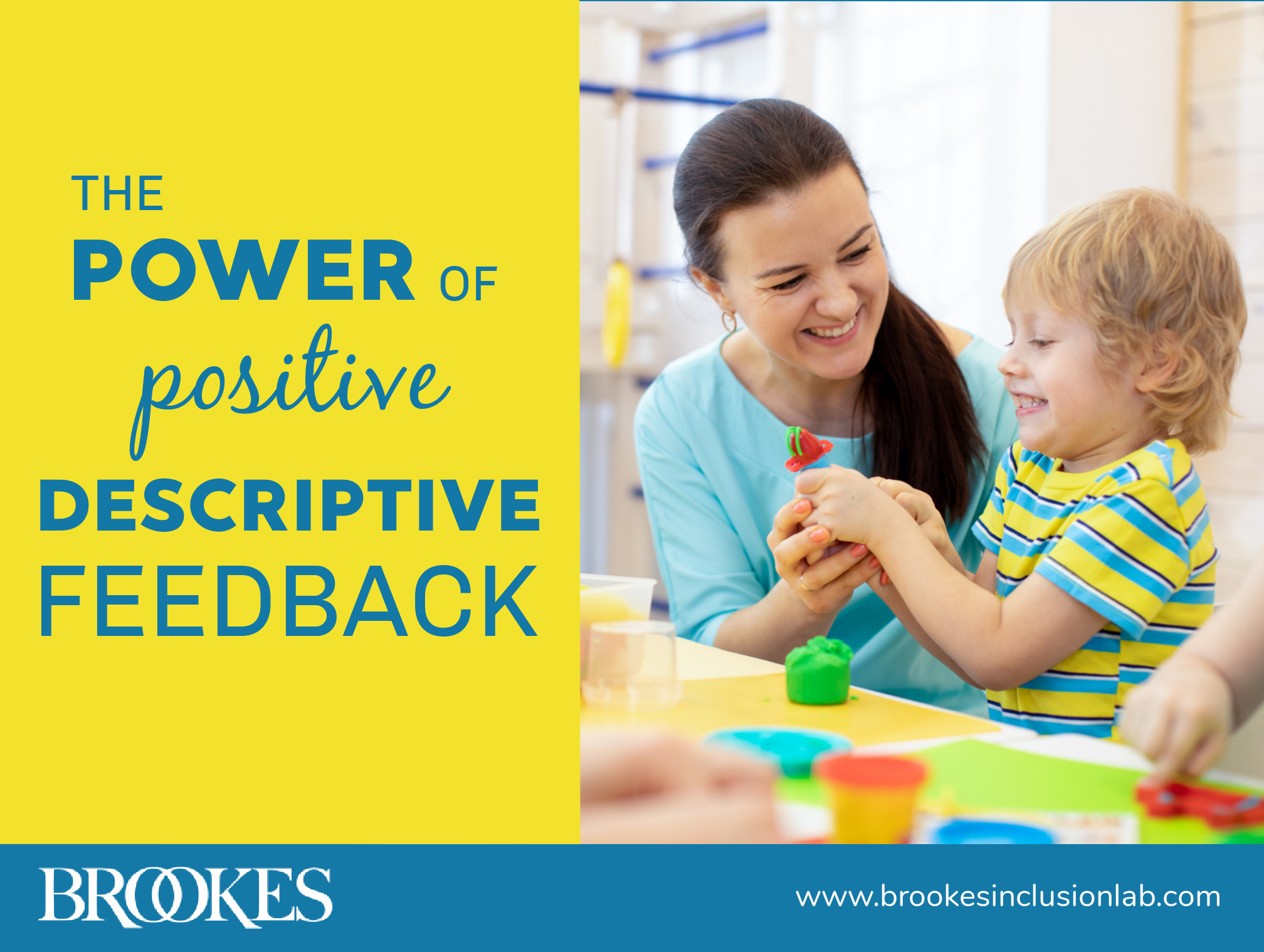
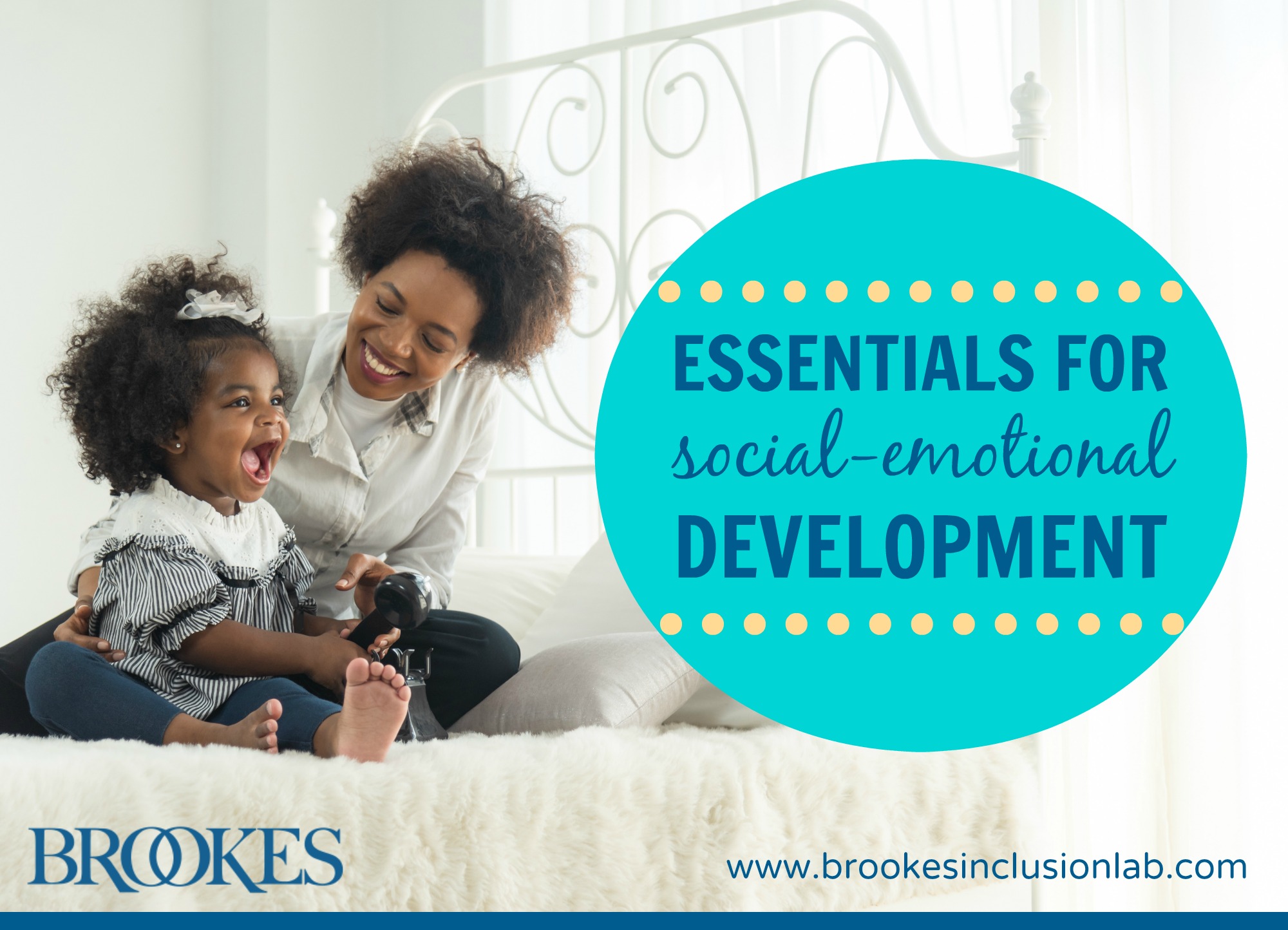
Write a Comment
Your email address will not be published. Required fields are marked *
Post a Comment